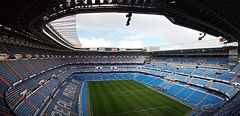Football in Spain

Football is the most popular sport in Spain.[1] The Royal Spanish Football Federation (Real Federación Española de Fútbol) is the national governing body and it organises La Liga, the Copa del Rey and the Spain national football team, champion of the 2010 FIFA World Cup.[2][3][4][5] Modern football was introduced to Spain in the late 19th century by a combination of mostly British immigrant workers, visiting sailors and Spanish students coming from Britain.
The oldest football clubs in Spain are Recreativo de Huelva and Sevilla FC. [6][7][8][9] Although Gimnàstic de Tarragona was formed in 1886, the club did not form an actual football team until 1914. The first official football game played in Spain took place in Seville on March 8, 1890 at the Tablada Hippodrome. Sevilla FC played against Huelva Recreation. With the exception of two Spanish players on the Huelva team and other two players on the Seville team, all the players on both sides were British. Sevilla FC won 2-0 that first official match in Spain.
In the Basque Country during the early 1890s, British shipyard workers and miners formed the Bilbao Football Club and Basque students returning from Britain founded the Athletic Club in 1898. This early British influence was reflected in the use of English names such as Recreation Club, Athletic Club and Football Club.
Real Madrid is the most successful Spanish and European club, in both the national league and continental competitions.[10] They have won a 10 European Cups/Champions League titles and were runners-up 3 times. Barcelona come 2nd in Spain in terms of league titles and are much behind when it comes to Europe. In La Liga's 83-year history (sans the 3 seasons that the league was suspended due to the civil war), Real Madrid and Barcelona have won 54 titles between them. Over the years, Spanish clubs have won the UEFA Cup Winners' Cup 7 times and UEFA Europa League 8 times.
Copa del Rey
Several clubs also emerged in Madrid, most notably Madrid Football Club, formed in 1902. In the same year, Carlos Padrós, later president of Madrid FC, suggested a foot competition to celebrate the coronation of Alfonso XIII. Four other teams entered the Copa del Ayuntamiento de Madrid, later to develop into the Copa del Rey (King's Cup). These included FC Barcelona, Club Español de Fútbol, Club Bizcaya and New Foot-Ball de Madrid. The competition featured the first recorded game between FC Barcelona and Madrid FC, with the former emerging 3-1 winners. Club Bizcaya, which consisted of players from both Basque teams, eventually beat FC Barcelona in the final. Alfonso XIII subsequently became the patron of many Spanish football clubs, granting them permission to use Real (meaning royal) in their names. Among the many clubs to add the prefix to their name was Madrid FC, which subsequently became Real Madrid.
La Selección
Within Spain, regional teams, most notably, the Catalan XI, the Euskadi XI, and even the Galician XI began to compete against each other from 1915 onwards. Despite not being officially recognised by FIFA, these teams continue to play today. The Spain national football team, commonly referred to as la selección made their international début at the 1920 Olympic Games in Belgium and came away with the silver medal. Spanish football turned professional in 1926.
Today, these regional teams still occasionally play friendly games with some national team players playing for both teams.
La Liga
In April 1927 Alvaro Trejo, a director at Arenas Club de Getxo, first proposed the idea of a national league in Spain. After much debate about the size of the league and who would take part, the RFEF eventually agreed on the ten teams who would form the first Primera Division in 1928. FC Barcelona, Real Madrid, Athletic Bilbao, Real Sociedad, Arenas Club de Getxo and Real Unión were all selected as previous winners of the Copa del Rey. Athletic Madrid, RCD Español and CE Europa qualified as Copa del Rey runners-up and Racing Santander qualified through a knock-out competition against Sevilla FC. Only three of the founding clubs, Real Madrid, Barcelona and Athletic Bilbao, have never been relegated from the Primera Division; six other clubs have never been below the top two tiers: Sevilla, Real Sociedad, Sporting Gijón, Valencia, Espanyol, and Atlético Madrid.
Women's football
Women's football is a minor sport in Spain.[11][12]
References
- ↑ "Spanish football: Well red". The Economist. 2012-06-09. Retrieved 2013-10-07.
- ↑ Graham Hunter. "Spain: the inside story of La Roja's historic treble – extract | Football". The Guardian. Retrieved 2015-01-30.
- ↑ Ahmed, Rizwan (2011-06-28). "The Success Of Spain: A Lesson For Every Football Nation". Thehardtackle.com. Retrieved 2015-01-30.
- ↑ Tim Vickery. "Tim Vickery: Spain success built on clear football identity". BBC. Retrieved 2015-01-30.
- ↑ Paul Wilson. "How England could learn from Spain's approach to youth | Football". The Guardian. Retrieved 2015-01-30.
- ↑ "The British Newspaper Archive". The British Newspaper Archive. Retrieved October 5, 2012.
- ↑ "The Courier". The Courier. Retrieved February 7, 2013.
- ↑ "Marca". Marca. Retrieved October 9, 2012.
- ↑ "Evening Times". Evening Times. Retrieved October 11, 2012.
- ↑ Sid Lowe. "Review: The Story of Spanish Football | Football". theguardian.com. Retrieved 2013-10-07.
- ↑ "Why Spain is absent from the World Cup". Fox Soccer. Retrieved 2012-12-07.
- ↑ "Spain's women add to La Roja euphoria". FIFA. Retrieved 2012-12-07.
External links
| ||||||||||||||||||||||||||||||||||||||
| ||||||||||||||